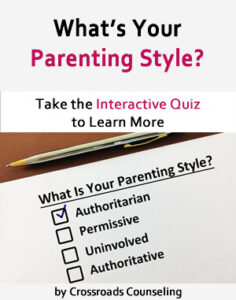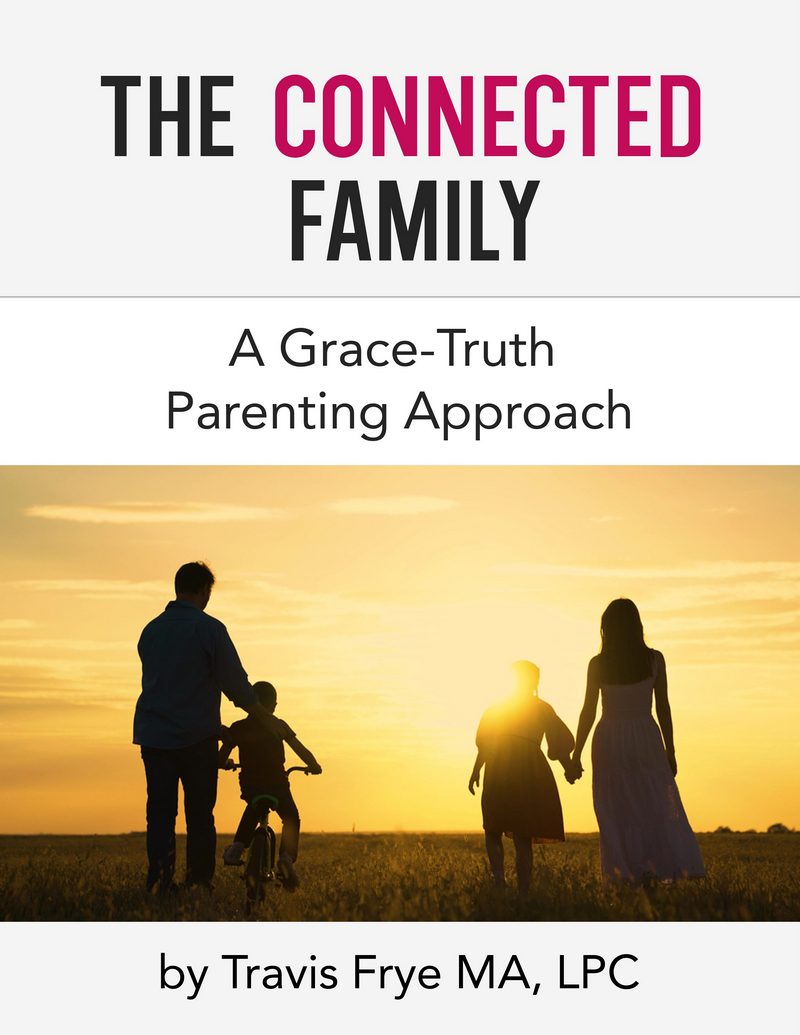What’s Your Parenting Style?
Have you ever wondered what your parenting style is? Or do you wonder what is your spouse or partner’s parenting style? Do you know the different parenting styles? To begin with, family researchers, specifically Diana Baumrind, has identified a parenting continuum existing between two constructs: “demandingness” and “responsiveness.” Let’s take a closer look at what Diana Baumrind and other family researchers mean when they refer to demandingness and responsiveness.
Demandingness and Responsiveness
First, let’s talk about demandingness. Demandingness is defined as, “the claims parents make on children to become integrated into the family whole, by their maturity demands, supervision, disciplinary efforts and willingness to confront the child who disobeys” (Baumrind 1991). Another way to think of demandingness is tough love. Tough love means holding your children accountable and giving them consequences. Tough love is teaching and correcting their behavior when needed. It means discipling the child when called for. Finally, it means having rules, standards, and expectations for your child.
Derived from the demanding-responsive continuum are Diana Baumrind’s three parenting styles. A fourth parenting style was added later by other family researchers. They are: Authoritarian, Permissive, and Authoritative. Uninvolved is the fourth parenting style identified at a later time. As you will see, the three parenting styles will each have their place on the demanding-responsive continuum with the uninvolved parenting style being the only one that is not on the scale.
The Four Parenting Styles
Authoritarian
Authoritarian parents expect their children to obey without question. The phrase, “Because I told you so,” is often said by authortarian parents as a way to control children. There is little to no responsiveness with this parenting style. It is all about rules, truth, and discipline. It is at the extreme side of demandingness on the continuum and fear is used as a means of control. Children of this parenting style may be compliant, but ultimately they have lower confidence and may suffer from depression and anxiety.
Permissive
The permissive parenting style has the components of being responsive and caring but lack the initiative to set appropriate boundaries with their children. This style is on the extreme side of responsiveness on the continuum. Permissive parents become their child’s friend rather than the wise and caring caretaker they need for healthy development. Children of permissive parents tend to have elevated levels of self-confidence and do not really suffer from depression and anxiety. However, they tend to have higher levels of problematic behavior (defiance, truancy, drug use) and often do not perform well academically.
Uninvolved
Uninvolved parents are neither demanding nor responsive. The uninvolved parent does not give emotional support or set appropriate rules and guidance. They are disengaged, uninterested, and unresponsive. Children with uninvolved parents are provided with a place to live, food, and little else. They are essentially on their own. Children who group up in homes with uninvolved parents will often act out in extreme levels. Sadly, many children who are a part of the juvenile criminal system have grown up in home with parents who are uninvolved.
Authoritative
It can said that the authoritative parenting style is in the middle of the continuum. It is balanced between demandingness and responsiveness. Parents provide a mixture of structure and care. The child is disciplined with a combination of fairness and love. Parents are not harsh nor are they a push-over. They are engaged by challenging their children to be their best, while being there for them when they at their worst. Children of parents who have an authoritative parenting style tend to be well adjusted, perform well academically, confident, emotionally secure, and develop empathy towards others.
Walking the Balance Beam!
The goal in parenting is to find the balance between demandingness and responsiveness. Walking the parenting balance beam and knowing when to be demanding and when to be responsive is the key to raising well balanced, loving, and successful children. What I learned is that it is possible to be both demanding and responsive all at the same time. An illustration of this is when my son rode his bike away from me after I told him not to. When I could not see him I was both angry and afraid. Once I finally reached him I explained to him how afraid I was not being able to see him and reassured him how of much I care. I also gave him a consequence for his behavior and set boundaries for future bike rides.
I share this story from my family to share what it looks like to walk the parenting balance beam. Of course, there are times when just like a gymnast I lean too far on one side and that is when I inevitably fall. I am either demanding when I really need to be responsive or vise versa. This is when we need to realize that we do not have to be perfect as parents. When we fail, not if, we can always model to our children humility and come back with the response they truly need.
Closing
If you are a parent or a caretaker of a child or a teen and want to learn more about our family counseling, child counseling, teen counseling, or parenting classes then call one of our Phoenix and Scottsdale Relationship Centers at 623-680-3486 or email info@crossroadsfcc.com. We would love to help you become more successful in walking the parenting balance beam!
You may visit our family counseling page by clicking here.
Next Steps
Parenting is challenging! We could all use a little help? Call us at 623-680-3486,text 623-688-5115, or email info@crossroadsfcc.com. You can ask all the questions you have and see how we can help you with parenting. Our offices are conveniently located throughout the Valley of the Sun including Phoenix, Anthem, and Scottsdale. We would be honored to support you in better understanding your relationship. You can start your therapy journey by following these simple steps:
- Contact Crossroads Counseling
- Meet with a child, family, and teen therapist
- Begin addressing your relationship struggles








